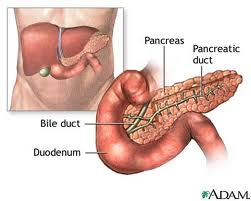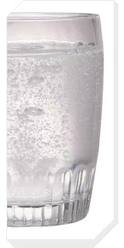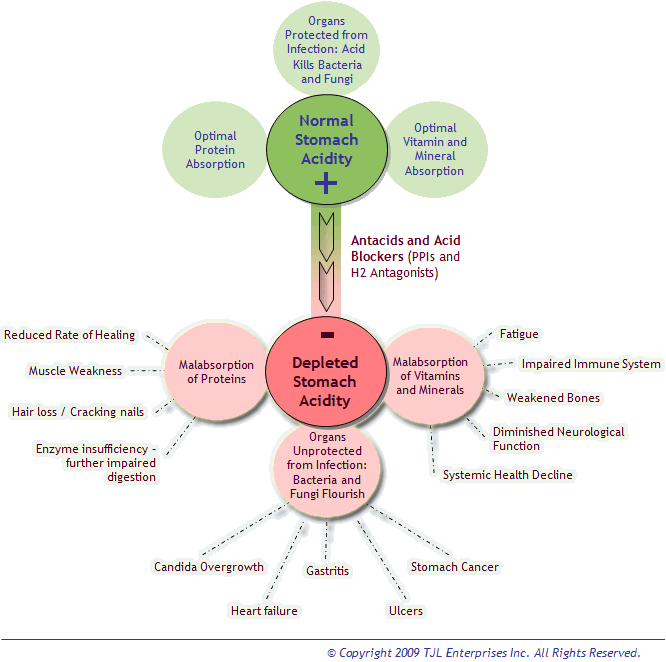Are Natural Remedies for Heartburn
More Effective than Antacids?
Whether you should try natural remedies for heartburn or just reach for antacids it depends on whether you want a temporary or permanent solution to your problem.
But to be able to improve your digestion effectively you first need to understand a few things on how it works.
On this page you'll find these matters discussed:
- How Digestion Works
How Digestion Works
Digestion is a crucial process to your health and well being and many things can go wrong along the way and can disrupt the process.
The food we eat is made up of large molecules that can't possibly enter our bodies and cannot be absorbed as they are.
First they need to be broken down into much smaller particles that can physically get across the lining of the digestive tract and are also recognized and accepted by the body.
This breaking down job is performed by the digestive enzymes.
These enzymes are produced in large quantities at different stages along the digestive tract. If you don't produce enough of them you can't digest your food properly.
This means that incompletely digested food hangs around in the small intestine, feeding the bacteria that live there and this will produce gas, resulting in bloating, flatulence and digestive pain, which are symptoms of indigestion and heartburn. Or cause leaky gut syndrome, as discussed in a previous article.
Not digesting and absorbing your food properly means that you're unable to absorb the nutrients in the food you eat, and as a consequence you can suffer with malnutrition and, in the long-term, more insidious problems, such as inflammatory bowel syndrome, digestive infections (such as Candida) and allergies.

The pancreas is a major producer of these digestive enzymes, but it depends on vitamins and minerals to do its job properly and if you're not digesting your food you don't get the nutrients you need to make these enzymes - so it's a vicious circle.
This is why natural remedies for heartburn are the best choice. You need to increase your body's ability to produce these enzymes rather than suppress stomach acid with antacids.
The best way to improve your digestion is to take digestive enzymes, they're among the best natural remedies for heartburn and indigestion.
While there is no harm in taking digestive enzymes on an ongoing basis, correcting digestive enzyme levels with supplements increases the body levels of nutrients.
Once this is achieved, digestion often improves on its own accord and then the digestive enzyme supplements may no longer be necessary.
How Do Antacids Work?

Although not an enzyme, one of the most critical factors in digestion is stomach acid, which is made up of hydrochloric acid (HCl) produced by the parietal cells in the stomach along with intrinsic factor (for the absorption of vitamin B12 in the small intestine), and pepsinogen (converted into pepsin by HCl), which breaks down proteins, produced by the chief cells.
Too much or too little stomach acid are common causes of digestive problems.
People who overlook natural remedies for heartburn and reach for antacids may actually make the problem worse.
The digestion of proteins starts in the stomach, but for macromolecules to be broken down efficiently, the pH of the stomach needs to be kept around 1.5 - 3. The protein-digesting enzyme pepsin is activated only in a very acidic environment.
The use of acid-blocking medications increases stomach pH to 3.5 or higher so protein digestion is impaired.
The wall of the stomach is normally protected from the action of digestive acid by a layer of mucus that is constantly secreted by the stomach lining. If the stomach produces too much acid, the sensitive walls of the stomach become exposed to the acid causing inflammation and pain.
Many things can disrupt the production of acid (see the article on Indigestion Causes), and the natural reaction would be to reduce this overproduction, which causes heartburn and indigestion, with the use of antacids.
But in the long run this will cause more problems. Why?
As the body needs stomach acid, parietal cells in the stomach will respond to decrease in acidity by producing more acid, so you constantly need to take antacids.
Eventually the parietal cells get exhausted, so over the long term, antacids cause the parietal cells to make less HCl, becoming one of the causes of heartburn and indigestion (the article on Indigestion Causes also explains how lack of stomach acid can cause indigestion).
Natural Remedies for Heartburn or Antacids?
Some people prefer a fast approach to digestive problems and believe that natural remedies for heartburn and indigestion are not very effective.
It's true that antacids may provide a temporary relief of symptoms of heartburn and indigestion. However in so doing, they may mask an underlying problem or suppress the symptoms of more serious problems like stomach cancer. So they mustn't be taken on an ongoing basis without consulting your doctor.
Choosing antacids over natural remedies for heartburn and indigestion can create some of the following problems:

- A recent study looked at 155 healthy people who had been using antacids over long periods of time.The study found that 47% had erosion of the oesophagus and 6% had Barrett's oesophagus (see the article on Causes of Heartburn).
- Most bacteria can't live in a high-acid environment and are killed in the stomach. Stomach acid provides our first line of defense against food poisoning, H. pylori, parasites and other infections. Without adequate acid, we leave ourselves open to decreased immune resistance.
- Many over-the-counter antacids contain excessive amounts of sodium, aluminium, calcium and magnesium. With prolonged use of these products, dangerous mineral imbalances can occur.
- Excessive sodium can aggravate hypertension and excessive aluminium has been implicated in Alzheimer's disease.
- Stomach acid is also necessary for absorption of many essential minerals, so mineral depletion may occur with prolonged use of antacids. Minerals that can become depleted include iron, calcium, magnesium, zinc and copper.
- Adequate levels HCl is necessary for the absorption of vitamin B12 from food. B12 deficiency causes weakness, fatigue and nervous system problems. Most B-complex vitamins require normal levels of stomach acid. Vitamin C levels are also low in people with poor stomach acid.
Natural remedies for heartburn, on the other hand, have no such side effects.
Types of Antacids
H2 blockers and Proton-pump inhibitors
H2 blockers, such as Tagamet and Zantac, and proton-pump inhibitors, such as Prilosec or Omeprazole, are the most common prescription medications used for acid reflux.
H2 blockers are a class of antihistamine drugs that blocks the action of H2 receptors in the body, which cause the release of stomach acid.
Proton pump inhibitors block the enzyme system that transports hydrogen ions across the cell wall into the stomach stimulating acid secretion.
These medications are effective while you take them, but once you discontinue their use, your problem often recurs.
Other Types of Antacids
Aluminium compounds - They may cause constipation, but they are often combined with ones containing magnesium. They can interfere with the absorption of phosphate from the diet, causing weakness and bone damage if taken in high doses over a long period.
Magnesium compounds - In large doses they can cause diarrhoea, and in people who have impaired kidney function, a high blood magnesium level may build up, causing weakness, lethargy and drowsiness.
Sodium bicarbonate - It reacts with stomach acid to produce gas, which may cause gas, bloating and belching. It's not advised for people with heart or kidney disease, as it can lead to an accumulation of water (oedema) in the legs and lungs or serious changes in the acid-base balance of the blood.
Calcium carbonate - It can cause a rebound effect in which the stomach produces more acid then before once antacid's effects wear off.
Combined compounds - Antacids may be combined with other substances called alginates and anti foaming agents. Alginates are intended to float on the contents of the stomach and produce a neutralizing layer to subdue acid that can otherwise rise into the oesophagus, causing heartburn.
Anti
foaming agents are intended to relieve flatulence. In some preparation a
local anaesthetic is combined with the antacid to relieve discomfort in
oesophagitis, although the value of these additive is dubious.
If you'd like to take a more natural approach to improving your
digestion then have a look at the next pages which will be discussing
some natural remedies for heartburn and indigestion.
RELATED PAGES:
Heartburn Remedies and Indigestion Relief
Causes of Heartburn and Acid Reflux
Indigestion Causes and Symptoms
Search for information on this site:
Receive Discover the Power of Healing Foods! Free
Newsletter
Articles in This Series:
Causes of Heartburn and Acid Reflux
Indigestion Causes and Symptoms
Natural Remedies for Heartburn
Heartburn Remedies and Indigestion Relief
Heartburn During Pregnancy - Healing Foods to Relieve Heartburn
Check Out This Offer:
This book will show you how Heartburn and Acid reflux are not diseases that require expensive drugs for the rest of your life!


New! Comments
Have your say about what you just read! Leave me a comment in the box below.